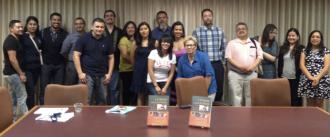Latinos and Latinas at Risk: Issues in Education, Health, Community and Justice, Editor/Author Gabriel Gutiérrez (Greenwood, 2015)

This Two Volume, Sixty-Nine Chapter, 828 page book was convened by CESPA and provides an overview of quality of life issues for Latinos/as at the turn of the 21st Century and is divided into 8 Section including “Cultural Diversity and Public Policy,” “Migration and Immigration,” “The Economy, Politics and Social Justice,” “Health Issues and Community Transformation,” “Education,” Art, Literature, Entertainment and Youth Culture,” and “Media Literacy.” It examines Latino/a quality of life issues within the historical context of US-Latin American Relations by examining the effects of identity on social positionality, social constructs and policy formation. At the center of this discussion is the transformative ways those identified as Latinos/as have actively worked toward assuring the best quality of life for themselves. This two volume work was the result of a three year research project that was initiated by CESPA with the collaboration of the Department of Chicano/a Studies at CSUN. It includes the research and writing of 30 former and current Chicano/a Studies Master of Arts students and 6 Chicano/a Studies faculty.
Holding Up a Mirror: Transnational Perspectives and Reflections on U.S. Latinidades (Forthcoming 2017)
As part of the scholarly collaboration established between CESPA and Casa de las Americas in Havana, Cuba, we are currently working with Dr. Antonio Aja Díaz, director of the program on Latina/o Studies, and Ana Niria Albo, M.A., principal researcher for the program on Latina/o Studies, to produce the anthology titled, Holding Up a Mirror: Transnational Perspectives and Reflections on U.S. Latinidades (Forthcoming 2017). This anthology brings Cuban and U.S. Latina/o scholars together to critically and dialectically examine transnational notions of Latinidad through an exploration of the ways contemporary migrations between the United States and Latin America disrupt and challenge dominant representations. Additionally, it explores the ways U.S. Latina/o cultural workers engage with notions of Latinidad and follow this examination with a study on Latina/os and socio-politics.
